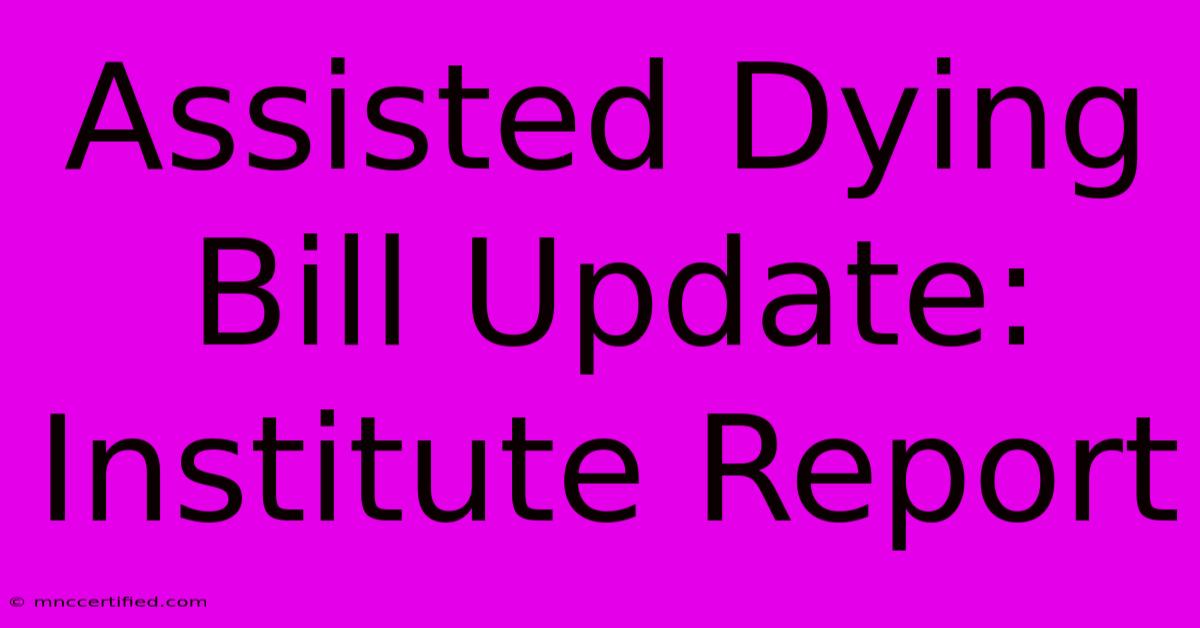Assisted Dying Bill Update: Institute Report

Table of Contents
Assisted Dying Bill Update: Institute Report Highlights Key Findings and Future Implications
The recent release of the Institute's report on the Assisted Dying Bill has sparked significant debate and analysis. This article delves into the key findings presented in the report, exploring their implications for future legislation and the ongoing ethical discussions surrounding assisted dying. We'll examine the report's methodology, its conclusions, and the potential impact on patients, healthcare professionals, and society as a whole.
Key Findings of the Institute Report on Assisted Dying
The Institute's report, a comprehensive analysis of the Assisted Dying Bill, presents several crucial findings that have shaped the current discourse. Key areas of focus include:
-
Eligibility Criteria: The report meticulously examines the proposed eligibility criteria, analyzing their effectiveness in preventing abuse and ensuring patient safety. The report likely scrutinizes factors such as the required diagnoses, prognosis limitations, and the necessity of multiple medical assessments. This section is critical, as the precise definition of eligibility directly impacts the number of people who could potentially access assisted dying.
-
Safeguards and Protections: A substantial portion of the report likely focuses on the safeguards implemented to protect vulnerable individuals from coercion or undue influence. This might include provisions for independent medical assessments, mandatory counseling, and stringent documentation procedures. The report's evaluation of these safeguards is crucial in determining the bill's overall safety and effectiveness.
-
Impact on Healthcare Professionals: The report likely addresses the potential impact of the Assisted Dying Bill on healthcare professionals, exploring their perspectives, concerns, and the need for adequate training and support. This includes examining the potential for conscientious objection and the development of protocols to ensure ethical and compassionate care for all patients.
-
Public Opinion and Ethical Considerations: The report may incorporate data on public opinion regarding assisted dying, providing insights into societal attitudes towards the issue. Furthermore, it likely engages with the complex ethical considerations surrounding end-of-life care, exploring arguments both for and against assisted dying. This section is vital for understanding the broader societal context of the debate.
-
Comparative Analysis: The report may offer a comparative analysis of assisted dying legislation in other jurisdictions, examining their successes and shortcomings to inform the development of the current bill. This comparative approach adds valuable context and allows for a more nuanced understanding of the potential consequences.
Implications for Future Legislation and the Ongoing Debate
The findings presented in the Institute's report will undoubtedly influence the trajectory of the Assisted Dying Bill. The report's recommendations, whether supporting or opposing the bill, will likely be carefully considered by lawmakers. Potential implications include:
-
Amendments to the Bill: The report’s recommendations might lead to amendments to the bill, strengthening safeguards, refining eligibility criteria, or addressing specific concerns raised by the Institute.
-
Further Debate and Public Consultation: The report could spark further debate and public consultation, allowing for a more informed discussion about the ethical and practical considerations of assisted dying.
-
Delayed Implementation or Rejection: Depending on the report's conclusions, the implementation of the Assisted Dying Bill could be delayed or even rejected altogether.
-
Shifting Public Opinion: The report’s findings might influence public opinion, potentially leading to increased support for or opposition to assisted dying.
Accessing the Full Report and Further Research
To gain a complete understanding of the Institute's findings, it's crucial to access the full report directly from the Institute's website. Further research into the ethical and legal aspects of assisted dying is also recommended to develop a comprehensive perspective on this complex issue. You can search for relevant articles, studies, and legal documents using keywords such as "assisted dying," "physician-assisted suicide," "right to die," and "end-of-life care." Remember to evaluate the credibility and bias of your sources.
This article provides a preliminary overview. It's vital to consult the primary source and conduct further research to fully grasp the nuances of this critical discussion. The implications of the Institute's report extend far beyond the immediate legislative process, touching upon fundamental ethical questions about life, death, and individual autonomy.

Thank you for visiting our website wich cover about Assisted Dying Bill Update: Institute Report. We hope the information provided has been useful to you. Feel free to contact us if you have any questions or need further assistance. See you next time and dont miss to bookmark.
Featured Posts
-
James Bond Theme Sheet Music
Nov 30, 2024
-
What Is Secured Bond In Jail
Nov 30, 2024
-
Assisted Dying Bill Update Institute Report
Nov 30, 2024
-
Barbour James Bond Commander
Nov 30, 2024
-
Nebraska Vs Iowa Full Ketv Preview
Nov 30, 2024